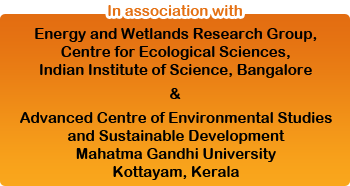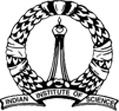| Introduction |  |
Scope |  |
Vembanad Wetland |  |
Themes |  |
Venue |  |
Registration |  |
Committee |  |
Reg. Form |  |
Contact |  |
Brochure |  |
Home |


 |
 |
 |
 |
 |
 |
Symposium focusing on lakes popularly known as “Lake symposium” was initiated by the Energy & Wetlands Research Group at Centre for Ecological Sciences, Indian Institute of Science, Bangalore in the year 1998. The theme was broadened in 2000 (Lake 2000) with a wider participation of organisations. The basic idea of the symposium was to bring out the trends in ecosystem conservation, restoration and management including the hydrological, bio-physical, people’s participation and the role of non-governmental, educational and the governmental organizations and the future research needs. Lake 2012 will be the 8th Biennial Lake Conference focussing on “Conservation and Management of Wetland Ecosystems”.
Wetland ecosystems are cradles of biological diversity, providing water and primary productivity upon which countless species of plants and animals depend for survival. The degradation of these vital ecosystems is linked to continuing problems of land cover changes, deforestation, habitat fragmentation, pollution, indiscriminate disposal of liquid and solid wastes.
Lake 2012 : “Conservation and Management of Wetland Ecosystems” would focus not only on updating of the current knowledge of the scientific community on wetland consevation and management and also would bring in awareness among students, teachers and public. This conference would provide a platform for interaction among researchers, policy makers, academics and NGOs , also would address the issues related to wetlands and biodiversity in an era of climate change. The conference it has been decided to have theme based lead lectures by the eminent scholars, oral and poster presentations by researchers, school and college students.
Vembanad wetland, a Ramsar site in India, having an area of 36500 ha, is the largest brackish, humid tropical wetland ecosystem and receives an average annual rainfall of about 3,300 mm. It is of great significance due to its hydrological function rich biodiversity, huge fish population and it is well connected with Arabian sea through Cochin estuary. Vembanad Lake besides providing feeding, spawning and rearing areas for fishes and clams also act as a sink of the agricultural and municipal waste. The environmental condition of the wetland is steadily declining due to over exploitation of the resources and dumping of agricultural run-off, municipal and other wastes. One among the major focuses of Lake 2012 would also focus the present status, possible restoration and management aspects of the Vembanad wetland, which is the lifeline of Central Kerala. A special session on Vembanad wetland is being planned as a floating session on the Vembanad Lake in a House Boat.
Papers are invited on the following themes from researchers, planners, social scientists, school (VIII – X students) and college students, school and college teachers.
Topics for Paper/Poster Presentation in Lake 2012:
- Wetlands: Restoration, Conservation and Management
- Climate Change and Coastal wetlands
- Tourism and Wetlands
- Biodiversity: Western Ghats, Rivers and Wetlands
- Interlinking of Rivers
- Application of Geoinformatics in Wetland Management
- Environmental Education and Sustainable Consumption
- Natural and Anthropogenic disasters
- Waste Management
- Pollution – atmospheric, terrestrial and aquatic - Monitoring and Management
- Sustainable Agriculture.
- Wetland Resources and Livelihood.
- Energy Conservation and Renewable Energy.
- Limnology.
- Green Technology
School of Environmental Sciences, Mahatma Gandhi University, Kottayam, Kerala would be the venue. Kottayam town is in the central Kerala and is well connected with other parts of the country by road, rail and air. Nearest air ports are Kochi and Thiruvananthapuram which are 80 and 150 km \away from Kottayam respectively.
Registration Fee
Delegates : Rs. 2500/-
Research scholars and students : Rs. 1500/-
Accompanying person : Rs. 1500/-
No spot registration
Mode of payment of Registration fee
Either through Demand draft Infavour of ‘ The Convener, Lake 2012, M.G.University, Kottayam’ [OR] Bank transfer through NEFT in to our account number 67191738224 with state bank of Travencore, M.G.University Campus branch, Kottayam IFSC Code:SBTR0000669).
The organizing committee has decided to waive registration fee to school students and school teachers whose papers are accepted for presentation in the technical session.
Last date for :
Abstract submission : September 10th, 2012
[Intimation of acceptance of abstract September 17th, 2012]
Full paper submission: October 5th, 2012
Registration closes on : October 6th, 2012.
| Local Organizing committee | |
| Patron | Dr. P.M. Rajan Gurukkal Vice Chancellor, Mahatma Gandhi University. |
| Co-Patron | Dr. Rajan Varughese Pro Vice Chancellor, Mahatma Gandhi University. |
| Chairman | Dr. C.T. Aravindakumar Director, School of Environmental Sciences, Mahatma Gandhi University. |
| Convener | Dr. E.V. Ramasamy Associate Professor, School of Environmental Sciences, Mahatma Gandhi University. |
| Members | Dr. A P Thomas, Director, ACESSD, Mahatma Gandhi University. Dr. Mahesh Mohan, Asst. Prof., SES, M.G.University. Dr. Sylas V P, Asst. Prof., SES, M.G.University. Dr. Sabu Thomas, Director, SCS,M.G.University. Dr. N V Unnikrishnan, Director, School of Pure & Applied Physics, M.G.University. Dr. Jyothis Mathew, Professor, School of Biosciences, M.G.University. Dr. Usha .K. Aravind, Mahatma Gandhi University, Kottayam. Dr. Christopher G, Mahatma Gandhi University, Kottayam. |
| National Advisory Committee | |
| Prof. V. N. Rajasekharan Pillai | Executive Vice President, Kerala State Council for Science,Technology and Environment (KSCSTE). |
| Dr. K. K. Ramachandran | Member Secretary, KSCSTE, Thiruvanathapuram. |
| Dr. R.V.Varma | Chairman, Kerala State Biodiversity Board , Govt. of Kerala. |
| Mr. P. Sreekantan Nair | Director, Dept. of Environment and Climate Change (DoECC), Govt. of Kerala. |
| Dr. George Chakacherry | Executive Director, Suchitwa Misson, Govt. of Kerala. |
| Dr. S.A. Abbasi | Pondicherry University, Puducherry. |
| Dr. Tripathi | National Botanical Research Institute, Lucknow. |
| Dr. J. M. Julka | Emeritus Scientist, ZSI, Solan, Himachal Pradesh. |
| Dr. Sarnam Singh | IIRS, Dehradun. |
| National Organising committee | |
| T.V. Ramachandra | CES, Indian Institute of Science, Bangalore. |
| A K Varma | ESD, Centre for Earth Science Studies, Thiruvananthapuram. |
| Kamalakshan Kokkal | KSCSTE, Thiruvananthapuram. |
| Ligy Philip | IIT-Madras, Chennai. |
| A.A. Mohammed Hatha | Cochin University of Science and Technology, Cochin. |
| Manilal V.B | CSIR – NIIST, Thiruvananthapuram. |
| A P Predeep Kumar | University of Kerala, Thiruvananthapuram. |
| M D Subash Chandran | CES, Indian Institute of Science, Bangalore. |
| N V Joshi | CES, Indian Institute of Science, Bangalore. |
| Shibu K Mani | Tata Institute of Social Sciences, Mumbai. |
| Samuel Paul Raj | Madurai Kamaraj University, Madurai. |
| Thilagavathy Daniel | Gandhigram Rural Institute – Deemed University, Gandhigram. |
| Punnen Kurian | Tropical Institute of Ecological Sciences (TIES), Kottayam. |
| Sultan Ahmed Ismail | Ecoscience Research Foundation, Chennai. |
| P S Harikuamr | CWRDM, Kozhikodu. |
| Balasubramanian K | Commenwealth of Learning, Canada. |
| M. Prithviraj | KSCST, Bangalore. |
| Harish Bhat | CES, IISc, Bangalore. |
| M.A. Khan | KK High School, Varthur, Karnataka. |
School of Environmental Sciences
Mahatma Gandhi University, Priyadarsini Hills P.O., Kottayam, Kerala.
| Sl no. | Presented by | Title | ||||
| 1 | Ramachandra T. V | Ecology, biodiversity, energy and hydrology linkages |
|
|||
| 2 | Subashchandran M. D | Forest Endemism in Relation to Hydrology of Western Ghats |
|
|||
| ‘My Village Biodiversity’: Students’ Involvement in Biodiversity Documentation in Uttara Kannada District, South India |
|
|||||
| 3 | Rao G. R | Seasonal Wetland Flora of the Laterite Plateaus of Coastal Uttara Kannada |
|
|||
| 4 | Prakash Mesta | Applications of GIS and Remote Sensing for Mangrove Management in Uttara Kannada, Karnataka State |
|
|||
| 5 | Mahima Bhat | Impact of Hydroelectric Dams on Fisheries in the Sharavathi Estuary of Uttara Kannada District, South-West India |
|
|||
| 6 | Sumesh N. Dudani | Conservation Strategies for the Hygrophilous Pteridophytes of Central Western Ghats |
|
|||
| 7 | Boominathan M. | Mangrove Associated Molluscs of India |
|
|||
| 8 | Balachandran C | Diversity and Distribution of Aquatic Insects in Aghanashini River of Central Western Ghats, India |
|
|||
| 9 | Gayatri H. Naik | In Situ Conservation of Traditional Rice Varieties of Uttara Kannada |
|
|||
| 10 | Shrikant Naik | Estuarine Bird Conservation in Uttara Kannada |
|
|||
| 11 | Vishnu D. Mukri | Roadside Trees of Uttara Kannada District, Karnataka |
|
|||
| 12 | Vishnu Bajpai | Carbon Emissions due to Electricity Consumption in the Residential Sector |
|
|||
| 13 | Uttam Kumar | Multi-sensor, Multi-resolution image fusion for Monitoring of Wetlands |
|
|||
| 14 | Durgamadhab M. | Sustainable Algal scum Management and Wastewater treatment in Bangalore |
|
|||
| 15 | Shwetmala | Environmental Implications of Mismanagement of Municipal Solid Waste |
|
|||
| 16 | Bharath H. Aithal | Status of Wetlands in Urbanising Tier II cities of Karnataka: Analysis using Spatio Temporal data |
|
|||
| 17 | Rajasri Ray | Ecological importance of relic forest patches – from species to ecosystem |
|
|||
| 18 | Anindita Dasgupta | Landscape dynamics, Rainfall and Stream Flow: Linkages |
|
|||
| 19 | Ganesh Hegde | Scope for Solar Energy in Kerala and Karnataka |
|
|||
| 20 | Bharath Setturu | Landscape dynamics of Uttara Kannada district |
|
|||
| 21 | Vinay S | Spatio-temporal dynamics of Raichur City |
|
|||
| 22 | Sowmyashree M. V | Temporal Analysis of Water Bodies in Ten Mega Cities of India |
|
|||
| 23 | Supriya G. | Use of Raman microspectroscopy to detect changes in lipid pools of microalgae |
|
|||
| 24 | Ashwath D. N | Ecosystem Goods and Services in Uttara Kannada |
|
|||
| 25 | Sudarshan P. Bhat | Status of Forests in Shimoga, Central Western Ghats |
|
|||
| 26 | Gouri Kulkarni | Carbon Footprint of Municipal Solid Waste in Greater Bangalore |
|
|||
| 27 | Sincy Varghese | Nutrient removal of Secondary Treated Water through Algal ponds |
|
|||
| 28 | Asulabh K S | Effect of Salinity Concentrations on Growth Rate and Lipid Concentration in Microcystis Sp., Chlorococcum Sp. and Chaetoceros Sp. |
|
|||
| 29 | Alakananda B | Microhabitat influence on diatom distributional pattern in diverse ecosystems |
|
|||